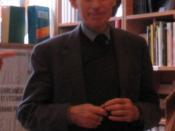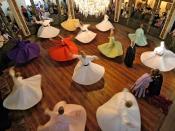Religious experience presents a convincing argument for the existence of God analyse this claim (12) S.T.Davies describes a Religious experience as a non-empirical, (all in the mind/ personal rather than analysable by science) experience. He said these experiences were often spontaneous, (believers need no preparation to have these experiences) and unique, (completely individual to the believer having the experience). Many experiences were never the same, even two experienced by the same person. They are always encouraging, showing a noticeable positive change in the person. One other term Davies used to describe religious experiences are wholly other, this means the experience is different to any other.
William James said that a religious experience was always ineffable, (too great to describe). James also used the word passivity to describe religious experiences, this meant that the believer lost a sense of self during the experience. He also said that there was a noetic quality to the experiences, so they gave insight into truths that were otherwise unattainable.
Finally he said that they were often transcient, so they were short in duration but had long term consequences.
There are also different types of religious experiences, six of these are, prayer, meditation, visions, mysticism, conversion, and miracles.
This argument is an a-posteriori synthetic argument, so therefore comes from experiences of the believers and experimentation. Part of the argument is a question that many people ask, ?is it a proof argument because God is encountered?? Also, ?can the experiences ever really be verified?? Many try to counter this argument using this series of statements: P1: If someone experiences an entity it exists.
P2: Some people experience God P3: God must exist Swinburne defends Religious experiences by first saying they have credulity that things are as they seem to be, the sources and senses are reliable.


